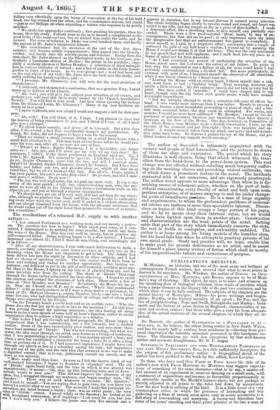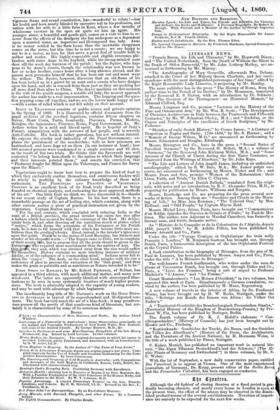_PUBLICATIONS RECEIVED.
M....1Vferimee, an historian, and one of the most acute and brilliant of contemporary French writers, has avowed that what he most prizes in history is its anecdotes. Mr. Windsor, the author of ETHICA ' OR OKA, RACTERISTIOS OF MEN, MANNERS' AN; BOOK' S appears to be of Med- mee's way of thinking. His object, le says, is to seize and winnow on the threshing floor of biological criticism those waifs of anecdote which form a large element in the literary life of the past two centuries and by which alone it can be fully realized. The subjects of his chapter; are the mental history of Montaigne; Milton—his prose writings and biogra- phies; Dryden, or the literary morality of an epoch ; De Foe, and the rise of pamphleteering; Pope and Swift, Bolingbroke and Harley ; Gold- smith and the history of prose fiction in England; characteristics of an- cient and modern orators ; but these titles give a rely far from adequate idea of the actual contents of the several chapters to which they are at- tached.
Dr. Bennett, the author of GATHERINGS OF A NATURALIST IN Au,. xnar,asrs is we believe the oldest living settler in New South Wales, and has for nearly half a century been assiduous in collecting from per- sonal observation the valuable materials presented in this handsome vo- lume. The illustrations are with few exceptions by that well-known author and accurate draughtsman, Mr. G. F. Angels.
SPEECHES IN PARLIAMENT AND SOME MISCELLANEOUS PAMPHLETS OF THE LATE HENRY DRUNLMOND, ESQ., is a title sufficiently descriptive for the purpose of this preliminary notice. A biographical sketch of the author has been prefixed to the work by the editor, Lord Lovaine.
To those who have read Out FAitat OF Fouu Acura the 'title of its author's new work FROM Herriss TO HOPPING may suggest expecta- tions of something of the same character—that is to say, a matter-of- fact account of an experiment in amateur farming on a small scale, with a statement of expenditure and income, as favourable proportionately in its ostensible results as Mr. Mechi's balance-sheet, but not perhaps so strictly adjusted in all points to the rules laid down 'by accountants. Now the new book is nothing of the kind. It is a little novel of a very commonplace order, in which the processes of haymaking and hop gathering on a farm of twenty acres serve only as scenic accessories to a dull story of love-making and marrying. A young and friendless bar- rister of ten years' standing and three years' practice at the bar, a man of
vigorous frame and sound constitution, has—wonderful to relate !—lost his health and been nearly blinded by excessive toil in his profession, and retires with his wife to a little farm in Kent, where a few months of wholesome exercise in the open air quite set him up again. His younger sister, a beautiful and gentle girl, comes on a visit to him to re- _ cover from the effects of the drudgery she has undergone as a dependent upon a married sister, an imperious and ill-tempered fine lady. Anne is no sooner settled in the farm house than the inevitable clergyman comes on the scene, but this time he is not a curate ; we are happy to say he is a rector, no less, for that saves a great deal of trouble both to author and reader. His highly respectable and eligible reverence phi- landers with sister Anne in the hayfield, while his strong-minded aunt does all; the week day business of the parish ; but the Squire, who hap- pens to be Anne's cousin, though the relationship was not known to her or to her brother, comes home after a long absence abroad, and the parson soon persuades himself that he has been cut out and must wear the willow. The Squire, however, discovers that an old flame of his has been locked up in a garret by an aunt and a cousin who have designs upon his hand, and she is rescued from them just as they are packing her off more dead than alive to China. The des ex machina on this occasion is the wife of the parish surgeon, a notable old lady, the nearest approach the author has made to a real impersonation. The hopping and the ques- tion popping come off together, and we see the lovers made happy at last —with a sense of relief which is not felt solely on their account.
ITALY IN TRANSITION consists of public scenes and private opinions in the Spring of 1860. It is illustrated by official documents from the papal archives of the revolted legations, contains fifteen chapters on Savoy, Mont Cenis, Turin Lombardy, Piacenza, Parma, Modena, Bologna, the Appennines, Florence, Rome, Papal Government, &e. Mr. Arthur writes in a mild and liberal spirit. He is hopeful of Italy's Future, sympathizes with the sorrows of her people, and is severely Anti-Catholic. His book is rather garrulous, but not without interest. He exposes the cruelty and imbecility of the Papal Government; ex- plains the punishment of the mordaechia ; tells us how prisoners are bastinadoed, and have dogs set on them (in one instance at least); how 800 accused persons were condemned in a single sentence and 82 shot, as the result of but two trials. He thinks that the Savoyarcls are well contented "to belong henceforth to the nation to which their language and their interests pointed them ;" and asserts his convictim that "Piedmont fought for Milan upon the Tchemaya, and France for Savoy upon the Mincio."
Vegetarians ought to know best how to prepare the kind of food to which they exclusively confine themselves, and omnivorous feeders will do wisely in profiting by the culinary knowledge of these mild enthusiasts. THE PRINCIPLES AND PRACTICE OF VEGETARIAN COOKERY is an excellent book of its kind, truly described as being founded on chemical analysis, and embracing the most approved methods of the art." One little fault we think we have discovered in it—thanks to our recent study of Captain Burton. In his last work, there is a remarkable passage on the art of boiling rice, which contains, along with other curious matter a piece of practical instruction not given by the vegetarian. Captain Burton says- " For the past century, which concluded with reducing India to the rank of a British province, the proud invader has eaten her rice after a fashion which has secured for him the contempt of the East. He delibe- rately boils it, and after drawing off the nutritious starch or gluten called " conjee," which forms the perquisite of his Portuguese or his Pariah cook, he is fain to fill himself with that which has become little more nu- tritious than the prodiga;sliusks. Great, indeed, is the invader's ignorance upon that point. Peacfbe to the manes of Lord Macaulay, but listen to and wonder at his eloquent words --'The Sepoys came to Clive, not to complain „A of their scant gre, but to propose that all the grain should be given to the Europea , w o required more nourishment than the natives of Asia. The Akjig,r. 1, they said, which was strained away from the rice would suffice -...---"Trif themselves. History contains no more touching instance of military fidelity, or of the influence of a commanding mind.' Indians never fail to drink the ' conjee.' The Arab, on the other hand, mingles with his rice a sufficiency of ghee to prevent the extraction of the 'thin gruel,' and thus makes the grain as palatable and as nutritious as Nature intended it to be."
FIRST STEPS TO ZOOLOGY, by Mr. Robert Patterson, of Belfast, has appeared in a third edition, with much additional matter, and many new wood-cuts. The latter are apparently identical with stereotyped illus- trations to be seen in some systematic treatises of much higher preten- sions. The book is admirably adapted to the capacity of young readers, and may be used with advantage by adult beginners.
The inordinately long title of Mr. Davison's work on the GOLD DEPO- SITS IN AUSTRALIA is typical of its superabundant and ill-digested con- tents. The book has very much the air of a blue-book ; it may peradven- ture possess all the merits of that cumbrous kind of literature, but cer- tainly it is characterized by some of its notorious defects.
Booxs.
E'hiea ; or Characteristics of Men, Manners, and Books. By Arthur Lloyd Windsor.
Gatherings of a Naturalist in Australasia ; being Observations principally on the Animal and Vegetable Productions of New South Wales, New Zealand,
and some of the Austral Islands. By George Bennett, M.D., &c.
Speeches in Parliament and some Miscellaneous Pamphlets of the late Henry Drummond, Esq. Edited by Lord Loraine. In two volumes.
Henry Hudson the Navigator. The original documents in which his career is recorded. Collected, partly Translated, and Annotated, with an Introduction, by G. M. Asher, LL.D .
From Haytime to Hopping. By the Author of" Our Farm of Four Acres," Precis de in Litterature Pranoite depuis son originejusqu'a nos jours. Com-
piled expressly for the Ilse of Schools and Students Graduating for the Com- petitive Examinations. By Leon Contanseau.
The Discovery and Geognosy of Gold Deposits in Australia ; with Comparisons and Accounts of the Gold Regions in California, Russia, India, Brazil, &c. Illustrated with chromo-tinted map.
Bentley's Cook's Everyday Book. Combining Economy with Excellence. Notes on Wealth, showing how to Preserve or Regain it by Diet, Regimen, &c.
With a Familiar Explanation of the chief Functions of the Human Body, and their Relation to the Mind. By W. T. Coleman, M.D.
Popular Astronomy. A concise Elementary Treatise on the Sun, Planets, Satellites, and Comets. By 0. M. Mitchell, LL.D. Revised by the Rev. L. Tomlinson, M.A.
Is it Place Jehu ? or Buorapartism. By an Ex-Cabinet Minister.
Army Misrule, with Barrack Thoughts, and other Poems. By a Common Soldier.
The Eighth Commandment, By Charles Reade.
NEW EDITIONS AND REPRINTS.
Marston Lynch ; his Life and Times, his Friends and Edçmies, his Victories and Defeats, his Kicks and Halfpence. A Personal Biograiphy. By Robert B. Though. With Portrait and a Memoir of the Author b George Augustus Sala.
Essays in Ecclesiastical Biography. By the Right Honour:it* Sir James Stephens, K.C.B. Fourth edition.
Easton and its Inhabitants. By the lion. Eleanor Eden, The Spanish Campaign in Morocco. By Frederick Hardman, Special Correspon- dent to The Times.



























 Previous page
Previous page